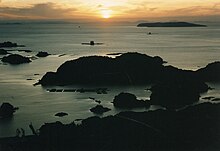Kujūku Islands: Difference between revisions
History |
Sights |
||
| Line 1: | Line 1: | ||
[[Image:Sasebo99IslandsSunset2A.jpg|thumb|Kujū-ku Islands]] |
[[Image:Sasebo99IslandsSunset2A.jpg|thumb|Kujū-ku Islands]] |
||
[[Image:TakashimaSasebo.jpg|thumb|Takashima, general view]] |
[[Image:TakashimaSasebo.jpg|thumb|Takashima, general view]] |
||
[[Image:Kuroshima14.jpg|thumb|''Tenshudo'' Church on Kuroshima]] |
|||
{{nihongo|'''Kujū-ku Islands'''|九十九島|Kujū-ku-shima}} is a group of islands ranging in the west coast of [[Kitamatsuura Peninsula]], [[Nagasaki Prefecture]], [[Japan]]. |
{{nihongo|'''Kujū-ku Islands'''|九十九島|Kujū-ku-shima}} is a group of islands ranging in the west coast of [[Kitamatsuura Peninsula]], [[Nagasaki Prefecture]], [[Japan]]. |
||
The Islands belong to the city of [[Sasebo, Nagasaki|Sasebo]], and the city of [[Hirado, Nagasaki|Hirado]]. The two biggest islands, Kuroshima and Taklashima, are easily accessible from the harbour of Ainoura in the north of Sasebo three times a day. |
The Islands belong to the city of [[Sasebo, Nagasaki|Sasebo]], and the city of [[Hirado, Nagasaki|Hirado]]. The two biggest islands, Kuroshima and Taklashima, are easily accessible by ferry from the harbour of Ainoura in the north of Sasebo three times a day. |
||
The total number of the islands is now formally considered to be 208. The whole area is designated part of [[Saikai National Park]]. |
The total number of the islands is now formally considered to be 208. The whole area is designated part of [[Saikai National Park]]. |
||
== Kuroshima == |
|||
Kuroshima ("Black Island"), the biggest island, has about 650 inhabitants who are mostly the descendants of Catholics who hid here to escape persecution after the [[Shimabara Rebellion]] of 1637. The island church, ''Kuroshima Tenshudo'', was built in 1902. It is one of the rare brick churches in Japan. It was declared an "Important National Heritage" in 1998. |
Kuroshima ("Black Island"), the biggest island, has about 650 inhabitants who are mostly the descendants of Catholics who hid here to escape persecution after the [[Shimabara Rebellion]] of 1637. The island church, ''Kuroshima Tenshudo'', was built in 1902. It is one of the rare brick churches in Japan. It was declared an "Important National Heritage" in 1998. Most of the island is covered by dense forest. There are a few paddy fields on Kuroshima as well, some of them are terraces which are very rare in Japan. In the middle of the island, there is a school, an administration building and a shop. |
||
== Takashima == |
|||
Takashima ("High Island"), the second largest island, has about 250 inhabitants. Its tallest mountain is 138 m |
Takashima ("High Island"), the second largest island, has about 250 inhabitants. Its tallest mountain is 138 m |
||
Revision as of 21:39, 13 February 2012



Kujū-ku Islands (九十九島, Kujū-ku-shima) is a group of islands ranging in the west coast of Kitamatsuura Peninsula, Nagasaki Prefecture, Japan.
The Islands belong to the city of Sasebo, and the city of Hirado. The two biggest islands, Kuroshima and Taklashima, are easily accessible by ferry from the harbour of Ainoura in the north of Sasebo three times a day.
The total number of the islands is now formally considered to be 208. The whole area is designated part of Saikai National Park.
Kuroshima
Kuroshima ("Black Island"), the biggest island, has about 650 inhabitants who are mostly the descendants of Catholics who hid here to escape persecution after the Shimabara Rebellion of 1637. The island church, Kuroshima Tenshudo, was built in 1902. It is one of the rare brick churches in Japan. It was declared an "Important National Heritage" in 1998. Most of the island is covered by dense forest. There are a few paddy fields on Kuroshima as well, some of them are terraces which are very rare in Japan. In the middle of the island, there is a school, an administration building and a shop.
Takashima
Takashima ("High Island"), the second largest island, has about 250 inhabitants. Its tallest mountain is 138 m
See also
External links
- The introduction of Saikai National Park Kujū-ku Islands(at the Saikai pearl sea resort site) Template:Ja
- SAIKAI PEARLSEA RESORT Official Site Transclusion error: {{En}} is only for use in File namespace. Use {{langx|en}} or {{in lang|en}} instead.

